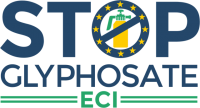The European Commission issued its formal response to the #StopGlyphosate European Citizens Initiative (ECI) [1]. It officially recognised the submission of more than one million signatures on 6 October. Tuesday’s response is an answer to the ECI’s three demands for a ban of glyphosate, a reform of the EU pesticide approval process and mandatory EU targets to reduce pesticide use. The Commission proposed action that could fulfil one aspect of one of the three demands.
Reacting to the news, ECI Coordinator David Schwartz said: “The Commission is trying to dress up its rejection of the #StopGlyphosate initiative with vague transparency proposals. Providing access to the data on toxic pesticides won’t make them any less dangerous. As long as the Commission leaves the testing of chemicals in the hands of the manufacturers, it will continue to lose the trust of citizens. We will continue to fight for meaningful measures to reduce pesticide use across the EU and for truly independent pesticide assessments”.
Angeliki Lysimachou, Environmental Toxicologist at PAN Europe, commented: “It is deeply regrettable that the current Commission has undermined its very own democratic procedures and has not addressed any requests of the ECI, the voice of the civil society. Glyphosate will be authorized without any clear restrictions on its use, the pesticide "safety evaluation" procedure will remain the same, resulting in the authorization of more harmful pesticides to be used in agriculture and green areas, and no clear goals will be set for a pesticide-free future. Is seems that EU regulators have forgotten where their mandate truly stems from: serving citizens, not corporations"..
Martin Pigeon, researcher and campaigner at Corporate Europe Observatory, commented: ““It beggars belief that the Commission hides behind capacity arguments – and even misrepresents the ECI’s demands – to not solve one of the biggest flaws in its procedures. The basis for the EU’s risk assessment of pesticides is going to remain data submitted by industry. With keeping such an input, how can one expect better outcomes?" [3].
The Commission responded to the ECI by saying it had no scientific or legal grounds for a ban of glyphosate and that national European governments had voted in favour of a five-year licence. This ignores the fact that the Commission proposal is supposed to take into account the scientific evaluation by the European Food Safety Authority (EFSA), scientific uncertainties that persist (applying the precautionary principle) and “other factors legitimate to the matter”. In addition to investigating the evident flaws in the EFSA health risk assessment, the Commission should have taken into account the classification of the UN cancer research agency, the existing scientific evidence on the unacceptable environmental risks posed by glyphosate and significant public concern.
The Commission’s proposal to increase data transparency is a partial and misleading response to the ECI’s demand that EU pesticide approvals be based only on fully published studies. Existing EU law already provides for the release of the studies, as confirmed by the European Court of Justice. EFSA has withheld data contrary to this ruling. A number of members of the European Parliament have therefore brought a case against it. Monsanto and Cheminova are supporting EFSA in this case. The Commission rejected the ECI demand for studies to be funded by industry but commissioned by regulators instead of industry. Its proposal for EFSA to exceptionally commission ad-hoc studies does not remedy the conflict of interest inherent in the current system.
While the Commission previously acknowledged that the EU is doing too little to reduce pesticide use, it simply deflected responsibility to national governments. This is despite the fact that the Commission must take action against governments that fail to implement the sustainable use of pesticides directive (SUD). The Commission also rejected the ECI demand to set EU-wide targets for pesticide reduction.
On 27 November, a qualified majority of governments voted to approve the Commission’s plan to grant a five-year unrestricted licence to glyphosate. France is leading a group of governments that want to end the use of glyphosate.
The European Parliament has called for a full glyphosate ban within five years, starting with a partial ban from 16 December 2017.
Contacts:
- David Schwartz: ECI Coordinator, WeMove.EU: +32 (0)486 07 83 42, david [at] wemove.eu
- Jörg Rohwedder: Senior Campaigner, WeMove.EU: joerg [at] wemove.eu
- Franziska Achterberg: Greenpeace EU food policy director: +32 (0)498 36 24 03, franziska.achterberg [at] greenpeace.org
- Angeliki Lysimachou: Environmental Toxicologist, PAN Europe : angeliki [at] pan-europe.info +32 (0)496 392930
- Martin Pigeon: Researcher and Campaigner, Corporate Europe Observatory (CEO): +32 (0)2 89 30 930 martin [at] corporateeurope.org
[1] The #StopGlyphosate ECI fulfilled the requirements set by the EU in less than five months, making it the fastest-growing ECI since the EU introduced this tool in 2012. It was backed by a broad, pan-European coalition of 38 organisations from 15 countries, including Corporate Europe Observatory (CEO), Greenpeace, the Health and Environment Alliance (HEAL), Pesticide Action Network Europe (PAN-E), and WeMove.EU.
[2] Greenpeace EU Press Release;
[3] Corporate Europe Observatory Press Release;
